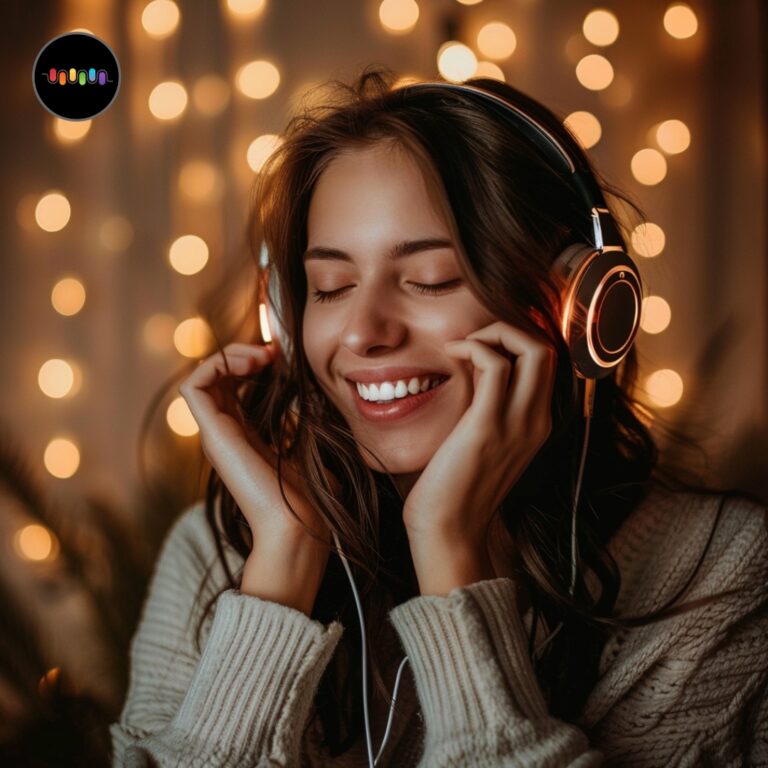There are over 13M+ creators on YouTube, establishing the size of the global creator economy in the coming years. When discussing the creator economy, how do we forget music and its role in making good content great?
However, getting the proper music license is like navigating a maze. If you need to know where you’re going, it could be more transparent and more accessible to take a right turn. And when discussing music for commercial use, taking the “right turn” is about using non-copyrighted music.
Using music without permission or violating license obligations lands you in serious legal trouble. Thus, navigating music licensing for commercial use requires caution and a thorough understanding.
Besides losing your credibility, you lose viewership, are forced to remove your content and face the risk of penalties and legal cases.
This article will guide you on buying music for commercial use. We will discuss music licensing and how to secure your projects ethically and legally. We will also share ethical sources for buying music for commercial use.
So, let’s get started.
Can you use any music for commercial use?
While it might feel like you can use any music piece available for free online, you cannot.
To use a piece of music commercially, you need the respective creator’s permission. Otherwise, you may land in legal trouble, such as copyright infringement and penalties.
This also means that you are not allowed to change the lyrics or music of songs for your personal use.
You need a music license to use someone else’s music commercially. A music license grants you permission to use the music or song based on the terms of the license. Each music license has its terms, which the copyright owner decides.
What is music licensing, and why do you need it commercially?
A music license is a legal agreement that permits you to use a music or song. It outlines the terms and conditions for using the music, especially for commercial purposes.
It specifies the duration of use, territory, and intended legal use. The license allows you to use the copyrighted music while respecting intellectual property rights legally.
In music licensing, there are two essential concepts:
Royalty-free music
Royalty-free music is licensed for a one-time fee and grants rights to use it in commercial projects and multiple times. You do not have to pay any additional royalty for using it more than once. This is a cost-effective way to obtain permission to use a piece of music commercially and for unlimited time.
Copyright-free music
Copyright-free music is not protected by any copyright and is free for use by anyone. You can use it commercially or modify it without permission or fee.
Music licensing is essential to ensure you are not using copyrighted music without permission.
Licensing is important because:
Learn how you can check if a song is copyrighted
Types of music licenses required for commercial use
There are several types of music licenses, each serving a different purpose and granting specific rights for using copyrighted music. Let’s check the important ones:
Here are the examples of different types of licenses for clearer understanding:

How To Buy a Music License for commercial download? 5 Tools and sources we use
When buying music for commercial use, you have multiple sources to explore.
We have listed five tools and platforms to source royalty-free music that grant you a music license for commercial use.
Beatoven.ai
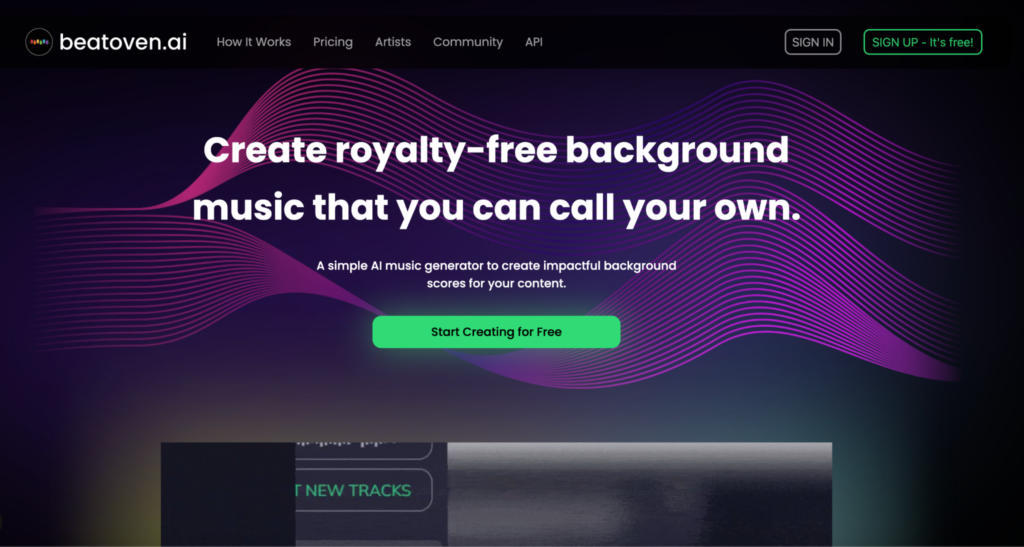
Beatoven.ai is an AI music generator that uses advanced music theories and production concepts to create 100% original, royalty-free music. It grants a perpetual license to use the soundtracks in your choice of use cases.
Beatoven.ai allows you to generate the music of your choice using text prompts and offers editing options to customize the music according to your desired emotions and genres. Beatoven.ai grants a license of use and access to advanced features and stem downloads.
Key features
Check out the top AI music generators in 2024
Pricing: A free plan is available. Subscription plans start from $6, you can also pay for track you like.
Bensound
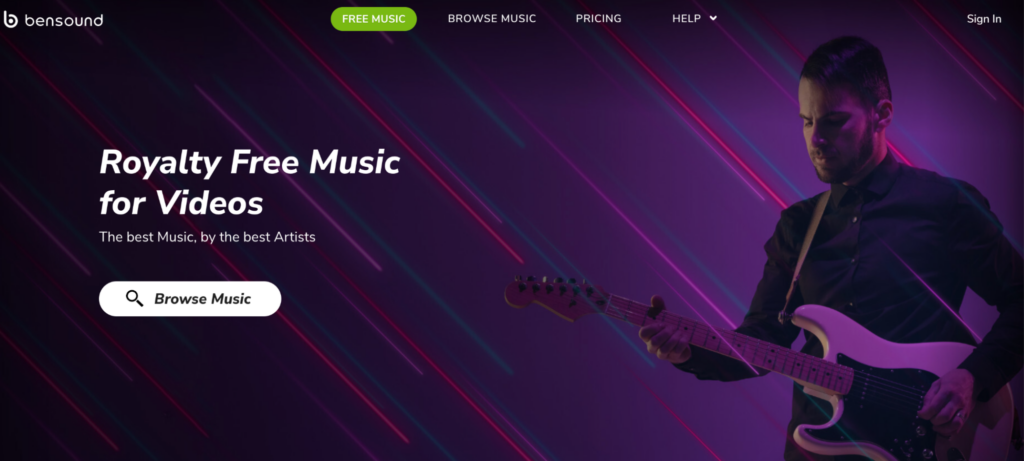
Bensound is a royalty-free stock music platform that offers music cleared and ready for use on YouTube, Facebook, Instagram, Vimeo, and others. It offers pay-per-track with a perpetual license that is valid forever.
Key features
Pricing: Free Source
Free Stock Music
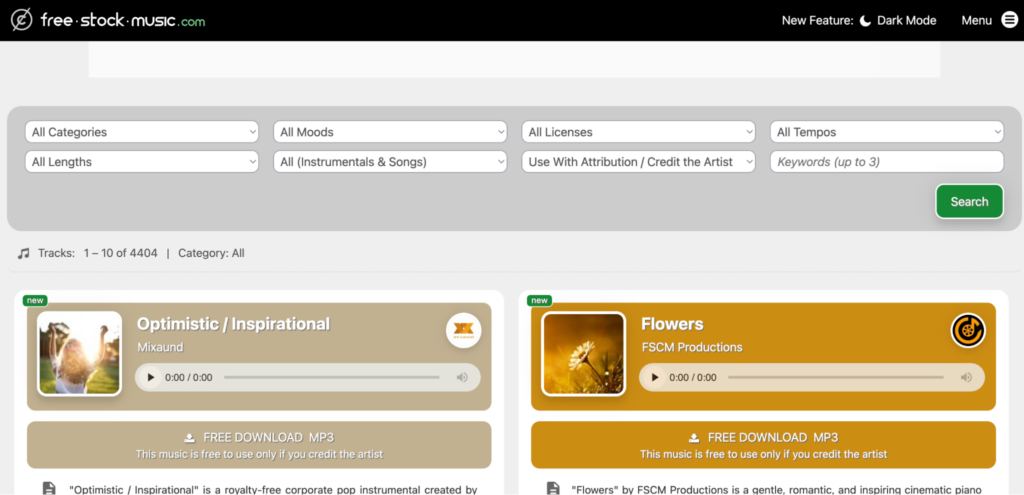
Free Stock Music offers a diverse library of music tracks and sound effects. Choose music for your projects with options like Use with credit. One license covers all music packs and bundles.
Key features
Pricing: Free Source
Free Music Archive

Free Music Archive has a vast collection of free, open-licensed music and soundtracks. It features popular genres, experimental and historical music, and other genre-based music from artists worldwide.
Key features
Pricing: Free Source
Artlist
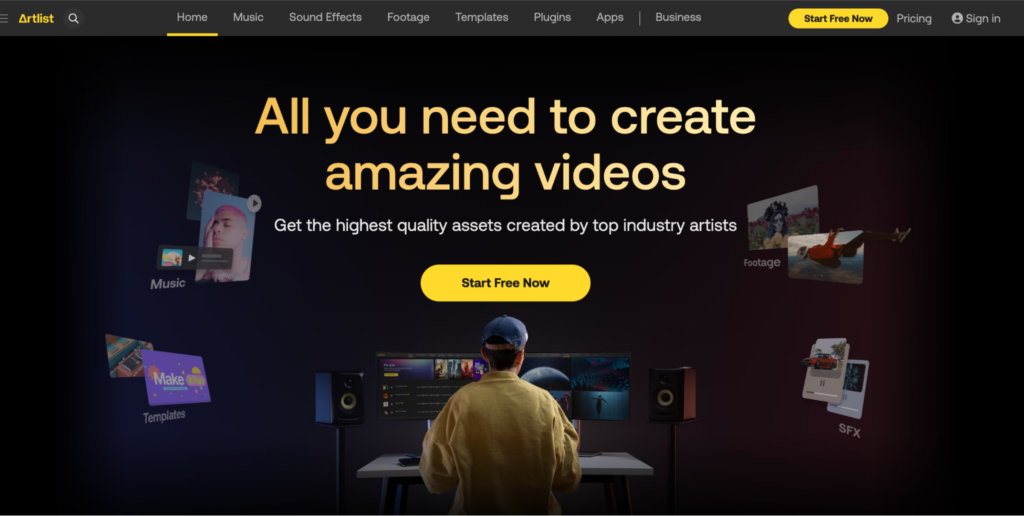
Artlist has an extensive library of royalty-free music and offers comprehensive features for complete video creation. It provides stock footage, video templates, editing software, and plugins to help creators find everything they need in one place.
Key features
Pricing: Free Source
Legal aspects to know before using licensed music for commercial use
There are several legal aspects to consider even after licensing to ensure compliance with copyright laws for music and licensing agreements. Consider these points when using licensed music for commercial use:
Copyright laws and infringement: Copyright laws protect the intellectual property rights of creators and grant them exclusive rights. Copyright laws for music ensure the creators receive the rightful compensation and credit for their work.
Infringement occurs when anyone uses, broadcasts, reproduces, distributes, or performs copyrighted music without legal authorization or permission. Check the terms before buying a music license to ensure it suits your requirements.
Fair use: This is a legal principle that allows using the copyrighted work without permission under certain circumstances like research, criticism, reporting, and educational purposes. When using music for such cases, adhere to ‘Fair Use’ guidelines.
Royalty-free vs Rights managed: These are two standard licensing models used for the commercial use of music. Royalty-free, as we know, involves paying a one-time fee for unlimited music usage. Rights management involves negotiating terms for each project, such as usage and duration. It has strict usage terms, which is costly but gives you more control. Ensure you negotiate based on your interests and requirements.
Attribution requirements: Some licenses require attribution to the original composer for commercial use along with the license, while others may only ask for attribution for using the music. You are advised to read the license terms very carefully to ensure compliance.
Contractual obligations: Each license has some obligations that must be adhered to. This includes restrictions on how the music can be used, limitations on the number of times it can be used, etc. As a general rule, carefully review the contractual agreements outlined in the license to comply with them.
Conclusion
Music licensing is essential to protect the copyright owner’s interest and establish your credibility as a creator and artist by legally sourcing music. Using original music is the best way to ensure that you always use royalty-free licensed music for your creative work and avoid legal troubles.
Whether you need background music for your short film, YouTube video, podcast, or agency, Beatoven.ai offers the safest option for buying music for commercial use.
It is Fairly Trained and Certified, as Beatoven.ai respects the creative rights of musicians and purchases music from them to generate unique music. Whether you’re building a musician’s website or simply need background music, with Beatoven.ai, be assured that the AI-generated music is high quality and is created responsibly.
Beatoven.ai also collaborates with artists to train their AI to generate unique music every time. They offer perpetual licenses for royalty-free music, ensuring no copyright strikes and claims.
To experience a worry-free licensing solution for royalty-free music for commercial use, try Beatoven.ai

Sreyashi Chatterjee is a SaaS content marketing consultant. When she is not writing or thinking about writing, she is watching Netflix or reading a thriller novel while sipping coffee.

